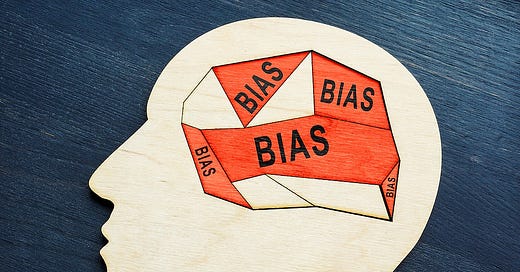Your Bias Is Your Superpower (When Used Right)
Let's talk about bias—one of many four-letter words in client service.
Mention it in a client meeting and watch the room shift. "I don't want to sound biased." "Let me be completely neutral here." It's become the thing we're trained to avoid, the scarlet letter that supposedly undermines our credibility.
However, here's the problem: we've made bias the villain when, in fact, neutrality is the real enemy. We like to say clients want objectivity. A neutral point of view. However, no one wants total objectivity. They want useful bias.
What Is Bias?
At its core, bias is simply a matter of perspective. A lean. A pattern of judgment shaped by experience, incentives, and lived outcomes. It's not inherently bad. It's how we move faster and avoid mistakes.
But the perception of bias? That's where things get tricky.
Bias has become a dirty word because we've confused it with dishonesty. We think having a point of view means we're pushing an agenda. So we bend over backward to appear "objective,” which usually just means we're being useless.
Bias is good when it feels earned. It's bad when it feels bought.
Let's talk about bias. Not the kind that makes headlines or sparks HR investigations—but the quieter kind. The kind that creeps into client conversations and shapes how agencies, consultants, and sales partners are perceived.
We like to say clients want objectivity. A neutral point of view. But no one really wants total objectivity. They want useful bias.
When Bias Is Seen as a Strength
Clients want partners with a point of view. It signals experience. Confidence. Scar tissue. If you've spent 10 years in adtech or optimizing retail media, a client should want to hear what doesn't work. If you've run 20 tests on personalization engines, you better have an opinion—and they should like to hear it.
That's bias—but it's bias with receipts.
Bias is perceived as good when:
It's rooted in real expertise or pattern recognition
It shows up as conviction, not rigidity
It helps clients navigate complexity or avoid wasted time
It's declared, not disguised ("Here's what I've seen work—and why")
If you've done something a hundred times, own your bias. Don't hide it—frame it. Let your experience speak, but make sure it's speaking for the client.
Where this goes wrong—and I've seen it many times—is when someone has specific experience, but a nuance comes up, and they still apply their bias blindly. They don't take a step back and consider: could my bias be clouding my judgment? Even with your bias, ask yourself what's different in this scenario and what you should consider.
You don't want your bias to become ignorant arrogance.
When Bias Backfires
Bias becomes a liability the second it smells like self-interest.
If your recommendation always leads to your product, your model, your budget—that's not expertise. That's protectionism.
Bias is perceived as bad when:
You discredit other options without fair comparison
You cherry-pick data to support your POV
You resist tough questions or alternate thinking
You're clearly more focused on your win than theirs
Clients don't mind if you have a POV. They do mind if you pretend it's neutral while pushing your own agenda.
Should You Always Declare Your Bias?
Not always. There's a difference between owning your experience and making it the center of the conversation.
Sometimes, holding back on your bias helps the client come to their insight. If you've already earned credibility, you don't need to lead with your POV every time. Let their context shape the moment.
The goal isn't to dominate the conversation—it's to guide it.
The Bias Balance
The worst thing you can be is neutral. How many times have I heard "I don't want to sound biased" or "I want to be neutral here"
Clients don't want a weather report. They want a forecast.
So:
Own your bias, but frame it as informed, not absolute (avoid ignorant arrogance)
Declare it when it serves the client. Don't weaponize it
Listen harder than you speak. Earn the right to share it
Because in the end, clients aren't allergic to bias. They need to know your bias is working for them, not against their best interests. And have no regrets doing so when you know it's in their best interest.
I have no problem stating—in fact, I can't hold back (it's my weakness)—truth-telling to a client. If something needs to be said, outlined, or explored, whether they like it or not, it will be said. Because if I have 100 receipts of this, I know it's in their best interest, and it's something they can either take or leave, then I've done my part.
Just don't be neutral. Don't be apathetic. Don't be ignorantly arrogant. Just be eager to help, with the experience you have. When your bias is rooted in serving others, rather than your ego, it will usually guide you in the right direction.
You have 8 hours in a day (although we all know we work more than that), so don't just be—do something, with a passionate bias.
P.S. If you're somewhere between figuring it out and faking it till Friday, check out CareerJig.com — the platform I built to help professionals stop guessing and start growing through real connection and networking. It’s free, no paywalls or b.s. and i’s human.




